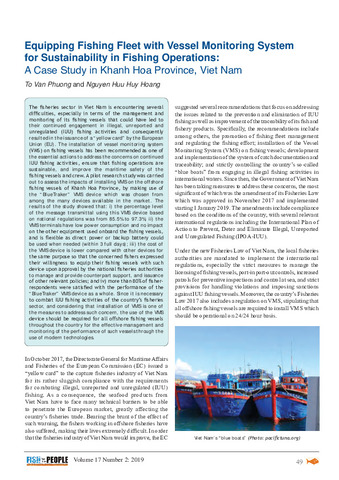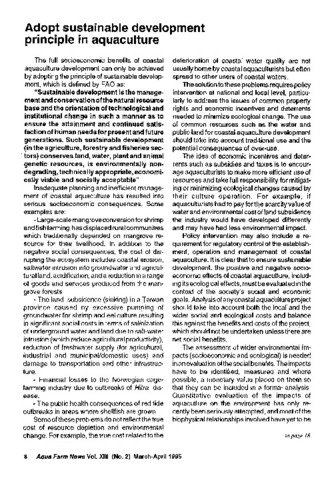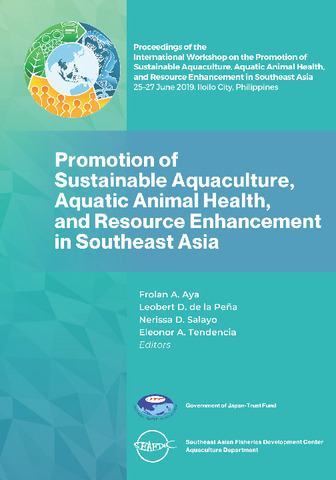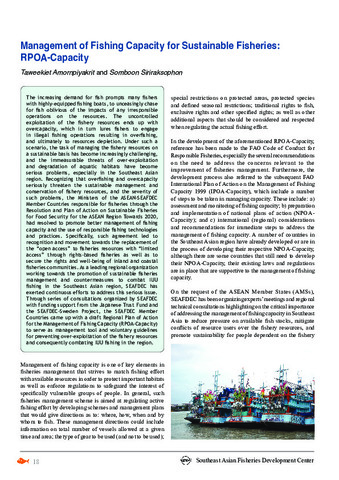Equipping fishing fleet with vessel monitoring system for sustainability in fishing operations: A case study in Khanh Hoa Province, Viet Nam
Share
ບົດຄັດຫຍໍ້
The fisheries sector in Viet Nam is encountering several difficulties, especially in terms of the management and monitoring of its fishing vessels that could have led to their continued engagement in illegal, unreported and unregulated (IUU) fishing activities and consequently resulted in the issuance of a “yellow card” by the European Union (EU). The installation of vessel monitoring system (VMS) on fishing vessels has been recommended as one of the essential actions to address the concerns on continued IUU fishing activities, ensure that fishing operations are sustainable, and improve the maritime safety of the fishing vessels and crew. A pilot research study was carried out to assess the impacts of installing VMS on the offshore fishing vessels of Khanh Hoa Province, by making use of the “BlueTraker” VMS device which was chosen from among the many devices available in the market. The results of the study showed that: i) the percentage level of the message transmittal using this VMS device based on national regulations was from 85.5% to 97.3%; ii) the VMS terminals have low power consumption and no impact on the other equipment used onboard the fishing vessels, and is flexible as direct power or backup battery could be used when needed (within 3 full days); iii) the cost of the VMS device is lower compared with other devices for the same purpose so that the concerned fishers expressed their willingness to equip their fishing vessels with such device upon approval by the national fisheries authorities to manage and provide counterpart support, and issuance of other relevant policies; and iv) more than 80% of fisherrespondents were satisfied with the performance of the “BlueTraker” VMS device as a whole. Since it is necessary to combat IUU fishing activities of the country’s fisheries sector, and considering that installation of VMS is one of the measures to address such concern, the use of the VMS device should be required for all offshore fishing vessels throughout the country for the effective management and monitoring of the performance of such vessels through the use of modern technologies.
Suggested Citation
Phuong, V., & Nguyen, H. H. H. (2019). Equipping fishing fleet with vessel monitoring system for sustainability in fishing operations: A case study in Khanh Hoa Province, Viet Nam. Fish for the People , 17(2), 49-55. http://hdl.handle.net/20.500.12066/5515
ວິຊາ
fishing vessels  ; fishery industry equipment
; fishery industry equipment  ; fishing gear
; fishing gear  ; fishery management
; fishery management  ; fishery organizations
; fishery organizations  ; fishery protection
; fishery protection  ; fishery regulations
; fishery regulations  ; resource management
; resource management  ; illegal fishing
; illegal fishing  ; resource conservation
; resource conservation  ; sustainable fishing
; sustainable fishing  ; sustainable development
; sustainable development  ; sustainability
; sustainability  ; monitoring systems
; monitoring systems  ; Viet Nam
; Viet Nam
 ; fishery industry equipment
; fishery industry equipment  ; fishing gear
; fishing gear  ; fishery management
; fishery management  ; fishery organizations
; fishery organizations  ; fishery protection
; fishery protection  ; fishery regulations
; fishery regulations  ; resource management
; resource management  ; illegal fishing
; illegal fishing  ; resource conservation
; resource conservation  ; sustainable fishing
; sustainable fishing  ; sustainable development
; sustainable development  ; sustainability
; sustainability  ; monitoring systems
; monitoring systems  ; Viet Nam
; Viet Nam
Collections
Related items
Showing items related by title, author, creator and subject.
-
Adopt sustainable development principle in aquaculture
Southeast Asian Fisheries Development Center, Aquaculture Department (Aquaculture Department, Southeast Asian Fisheries Development Center, 1995)The inadequate planning and inefficient management of coastal aquaculture has resulted into serious socioeconomic consequences. These are the displacement of rural communities which traditionally depended on mangroves due ... -
Promotion of sustainable aquaculture, aquatic animal health, and resource enhancement in Southeast Asia: Proceedings of the international workshop on the promotion of sustainable aquaculture, aquatic animal health, and resource enhancement in Southeast Asia, 25–27 June 2019, Iloilo City, Philippines
Aya, Frolan A.; de la Peña, Leobert D.; Salayo, Nerissa D.; Tendencia, Eleonor A. (Aquaculture Department, Southeast Asian Fisheries Development Center, 2021-12)This publication is a product of the workshop and compiles information from the thirty presentations made during the event. Reports from member countries, invited experts, and SEAFDEC/AQD projects supported by the GOJ-TF ... -
Management of fishing capacity for sustainable fisheries: RPOA-capacity
Amornpiyakrit, Taweekiet; Siriraksophon, Somboon (Secretariat, Southeast Asian Fisheries Development Center, 2016)The increasing demand for fish prompts many fishers with highly-equipped fishing boats, to unceasingly chase for fish oblivious of the impacts of any irresponsible operations on the resources. The uncontrolled exploitation ...




